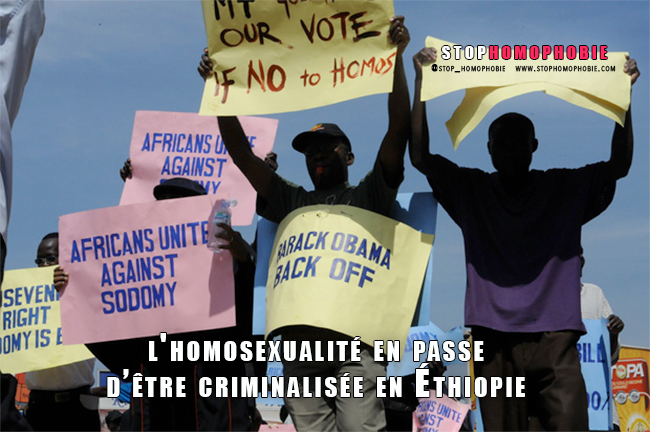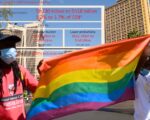Les législateurs s’apprêtent à faire adopter un projet de loi qui inscrirait l’homosexualité parmi les crimes impardonnables en vertu de la loi éthiopienne sur l’amnistie.
>> Ethiopian Lawmakers to Pass Bill Deemed Anti-Gay
La mesure a été largement appuyée la semaine dernière par le Conseil des ministres du gouvernement éthiopien. Les observateurs s’attendent à ce que le projet de loi soit appuyé lors du vote des parlementaires, la semaine prochaine.
En Éthiopie, les relations homosexuelles sont illégales et les personnes trouvées coupables d’en avoir eu sont passibles d’une peine d’emprisonnement pouvant atteindre 15 ans. Une détention de 25 ans peut être infligée dans les cas de personnes infectées par le VIH lors de relations entre personnes de même sexe.
À l’arrivée de chaque nouvelle année en Éthiopie, il est fréquent que le président accorde l’amnistie à des milliers de détenus. Cependant, le projet de loi dont il est question prévoit que le président serait dépouillé de son pouvoir d’amnistier certains criminels, dont ceux ayant eu des relations homosexuelles.
L’homosexualité est criminalisée dans 38 pays africains, soit 70 pour cent du continent, selon Amnesty International. L’Ouganda et le Nigeria ont récemment renforcé les punitions criminelles dont sont passibles les homosexuels.
>> Ethiopia’s lawmakers are set to pass a bill that puts homosexuality on a list of offenses considered « non-pardonable » under the country’s amnesty law, a measure that continues a trend of anti-gay legislation across Africa.
The bill, endorsed last week by Ethiopia’s Cabinet, is widely expected to pass when lawmakers put it to a vote next week.
Homosexuality is criminalized in 38 African countries, about 70 percent of the continent, according to Amnesty International. Uganda and Nigeria have recently strengthened criminal penalties against homosexuals.
In Ethiopia, same-sex acts are illegal and punishable by up to 15 years in prison. A 25-year jail term is also prescribed for anyone convicted of infecting another person with HIV during same-sex acts.
Ethiopia’s president often pardons thousands of prisoners during the Ethiopian New Year. If the bill becomes law, the president will lose his power to pardon prisoners who faced charges ranging from homosexuality to terrorism.
Tiruneh Zena, the head of the Ethiopian Human Rights Commission, said a presidential pardon is a privilege and not a right, the reason be believes the bill is not harmful to the lives of homosexuals.
« I won’t say the proposed law is not a cause of concern but I don’t think the law will affect the LGBT community in a serious way, » he said.
Homosexuality is largely a taboo subject in Ethiopia, ignored even by known rights groups, but the legislation under consideration suggests anti-gay sentiment may be spreading in this Horn of Africa nation
Zenebu Tadesse, Ethiopia’s minister for women, children, and youth affairs, was criticized on social media last month for a Twitter post that appeared to slam Uganda for enacting a severe anti-gay law.
Shortly after the tweet was published, Zenebu’s Twitter account was deleted. She later said the tweet was the work of unidentified hackers, and that she does not hold the views it expressed.
An Ethiopian group, the Addis Ababa Administration Youth Forum, says it plans to hold a mass rally in protest against homosexuals in the capital, Addis Ababa.


















